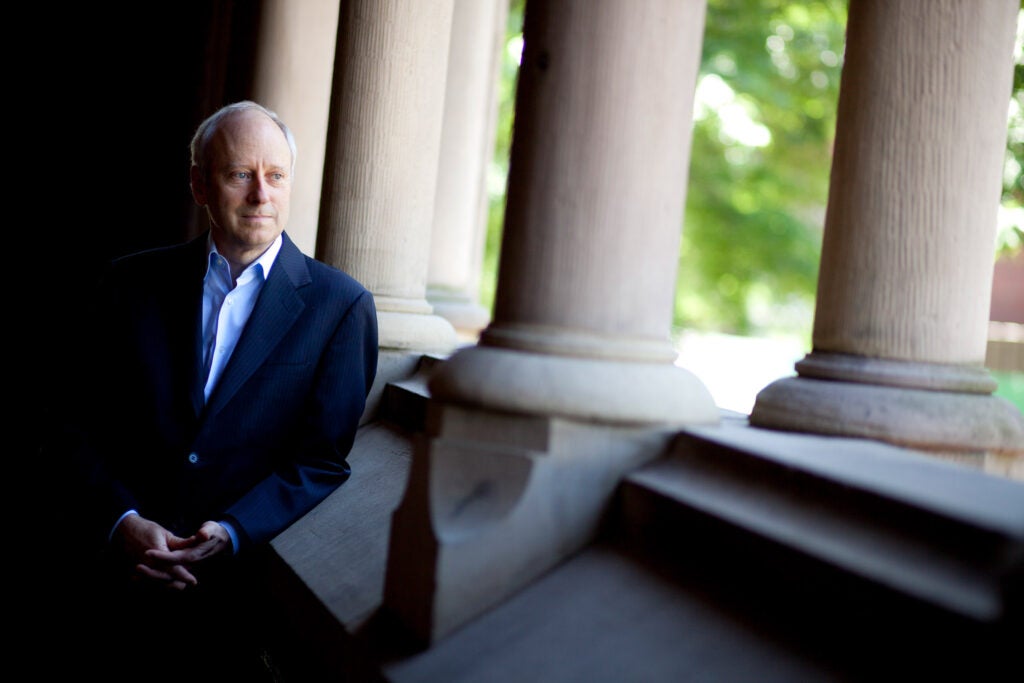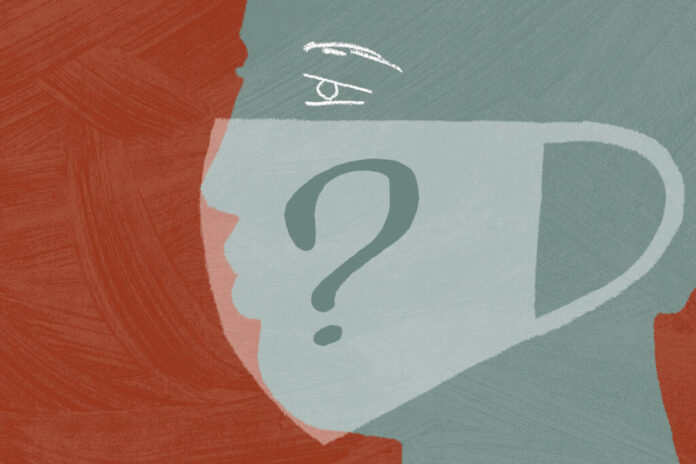By Colleen Walsh
Harvard Staff Writer/The Harvard Gazette
Wearing a mask and social distancing are two important barriers to COVID-19 infection, public health experts and government officials say. But adoption of the seemingly simple precautions has become a cultural battleground in a country where individual rights have long been considered part of the nation’s founding ethos. And yet, what do we owe our fellow citizens in the age of a deadly virus with no vaccine that has already taken close to 170,000 lives, and will likely take thousands, and potentially hundreds of thousands, more? In his popular course “Justice,” Michael Sandel, Harvard’s Anne T. and Robert M. Bass Professor of Government, regularly asks his students to take on such thorny ethical questions. He will do so again this fall with his new class, “Justice: Ethics in an Age of Pandemic and Racial Reckoning.” The Gazette recently asked Sandel for his thoughts on the subject.
Q&A
Michael Sandel
GAZETTE: So many people have chosen not to wear masks or to keep their distance from others, despite the data that those simple measures help save lives. Why is there such resistance?
SANDEL: The wearing of masks has become a flashpoint of partisan disagreement, a new front in the culture wars. On one level, this seems puzzling. Why doesn’t everyone simply wear a mask for the sake of public health? For two reasons: First, many Americans consider mask mandates a violation of individual liberty. They don’t want the government to force them to wear a mask. Second, many Americans resent governing elites who claim to derive their authority from science. Here, the debate over masks is similar to the partisan disagreement on climate change. Many supporters of President Trump share his resentment of elites and experts. They don’t trust experts who tell them they should wear a mask to reduce the spread of the coronavirus any more than they trust experts who say they should pay a carbon tax to alleviate climate change. The resistance to wearing a mask is not about public health; it’s about politics.

“The resistance to wearing a mask is not about public health; it’s about politics.”
Stephanie Mitchell/Harvard file photo
GAZETTE: What are our ethical obligations in the middle of a pandemic?
SANDEL: Our ethical obligations are, first of all, to minimize the possibility that our behavior will expose others to the risk of contracting the virus. This means wearing masks and social distancing. Beyond this, those of us who are fortunate enough to work from the safety of our homes have a responsibility to support those who take risks on our behalf — not only doctors, nurses, and hospital workers, but delivery workers, grocery-store clerks, maintenance workers, child-care workers, home health care workers. This support should take the form of public appreciation for such workers, but also tangible, material support, such as health care, paid sick leave, and wage support.
GAZETTE: There are periods in American history — like World War II — when nearly everyone spent years voluntarily sacrificing in service to a national cause. Why isn’t that happening now? What has changed?
SANDEL: The question reminds me of an internet meme early in the pandemic: “Your grandparents were called to war. You are called to sit on your couch. You can do this.” Even as the pandemic highlights our mutual dependence, it is striking how little solidarity and shared sacrifice it has called forth. Why do we seem incapable of solidarity at the time we need it most? The answer goes back to the social unraveling that preceded this crisis. The pandemic caught us unprepared — logistically and medically, but also morally unprepared. It arrived at a time of deep polarization and partisan rancor. Four decades of deepening inequality have driven us apart. Resentment of the elites whose policies produced these inequalities led to a populist backlash. The pandemic arrived at just the wrong moment — amid toxic politics, incompetent leadership, and fraying social bonds.
GAZETTE: How might Americans be the same or different from people in other societies in taking these types of individual steps to help society as a whole? Are there examples from COVID that you can point to?
SANDEL: Sadly, the U.S. has handled the COVID crisis worse than most affluent countries. We’ve had more than 4½ times the number of deaths per capita as Germany, 60 times the number in Japan, and more than 80 times as many as South Korea. Our poor performance is due partly to failed leadership at the federal level and the lack of an adequate public health system. But I think you are right to suggest that social habits and cultural factors come into play. Our ardent individualism is a strength in some settings but not in contending with a pandemic. In Japan, the ready acceptance of face masks seems to have reduced the spread of the virus. In Germany, the electorate supported far greater investment in wage replacement and public health spending than the U.S. government could muster. In South Korea, a single-payer health system made testing easier and more widespread. In addition, a social movement among landlords to reduce or freeze rents helped keep small businesses afloat.
GAZETTE: What role do leaders have in supporting this social contract?
SANDEL: Trust matters in a pandemic — not only trust in the scientific information and medical advice the government provides, but trust among citizens. Perhaps the single greatest responsibility of leaders in times of crisis is to inspire such trust. Angela Merkel in Germany and Jacinda Ardern in New Zealand are examples of leaders who have led their countries through the crisis effectively, in part by fostering trust. In this country, by contrast, we’ve seen how evading responsibility and sowing discord undermines the trust and solidarity we need to contend with the pandemic.
GAZETTE: What does this say, when we are all so culturally siloed, about the future of shared American values and what we owe to each other?
SANDEL: From the outset of this crisis, we’ve heard the slogan, “We are all in this together.” We hear it from politicians, advertisers, and celebrities. It evokes our mutual dependence and vulnerability in the face of COVID-19. It points to an inspiring ideal. But it rings hollow, because we know it doesn’t describe the facts on the ground. Some of us work from home and hold meetings on Zoom. Others have little choice but to risk their health and lives serving the public and delivering things to our doorsteps, enabling us to avoid risk. The people we now celebrate as “essential workers” are not the best-paid or most-honored workers in our society. This is a moment to ask how to reconfigure the economy to bring the rewards of such workers into better alignment with the importance of the work they do. This moment makes vivid the need for a broader public debate about the inequality this crisis has highlighted and a reconsideration of what we owe one another as citizens.
GAZETTE: What are some of the ethical questions you plan to take up in your fall semester, University-wide course “Justice: Ethics in an Age of Pandemic and Racial Reckoning”?
SANDEL: The course is an updated version of the “Justice” course I’ve taught over the years. The moral urgency of the pandemic and of this moment of racial reckoning prompted me to offer the course again, updated to include the ethical questions that confront us today. For example: Who should be first in line to get a coronavirus vaccine when one becomes available? Should we use cellphone tracking data to enforce stay-at-home orders? In deciding how to balance public health with reopening the economy, should we place a monetary value on human life? We will also take up current debates about racial injustice, including the question of reparations for slavery and racism. The course invites students to think through the fundamental moral and civic questions the crises of our day make unavoidable — about the meaning of a just society and our obligations to one another.
Interview was lightly edited for clarity and length.
(Reprinted with permission from the Harvard Gazette.)
















